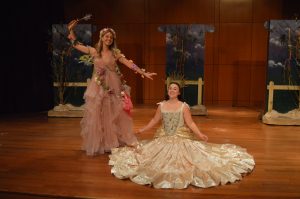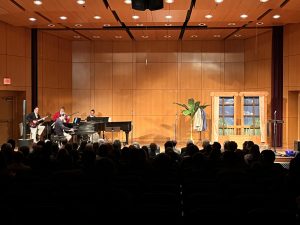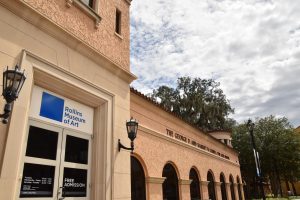 While many moviegoers tend to be distracted by the million-dollar effects and actors of Hollywood films, a select few last week chose a more unique film experience by attending the Latin American Short Film Festival, hosted by Associate Professor of Spanish Rosana Diaz-Zambrana on Wednesday, March 9. Dr. Diaz-Zambrana runs this annual festival with her Latin American Film Cinema class, selecting short films from all over Latin America that evoke emotion and complex philosophy.
While many moviegoers tend to be distracted by the million-dollar effects and actors of Hollywood films, a select few last week chose a more unique film experience by attending the Latin American Short Film Festival, hosted by Associate Professor of Spanish Rosana Diaz-Zambrana on Wednesday, March 9. Dr. Diaz-Zambrana runs this annual festival with her Latin American Film Cinema class, selecting short films from all over Latin America that evoke emotion and complex philosophy.
“The goal of the festival since we started in 2005,” she said, “has been to bring students a thought-provoking selection that hopefully will make them critically reflect on themselves, their world, and other worlds they might not know about. In doing so, I hope to foment a critical dialogue around important social and global issues in Latin America which as global citizens, constitutes the core of our mission statement.”
This year’s selections included films from Brazil, Cuba, Peru, Mexico, Puerto Rico, and Argentina. Each film tells a distinct tale filled with symbolism that not only sets a parallel to Western views, but helps audiences understand Latin American culture and issues in under 20 minutes. Dr. Diaz-Zambrana chose the short film genre because it is “an experimental and dynamic genre that it tends to utilize very unusual, provocative, and at times, unsettling approaches to storytelling which are ideal to spark the audience’s curiosity and intellect.”
All the films were fantastic, showcasing distinct storytelling and delivering messages of hope that sharply constrasted the cynical and dark messages often found in American cinema.
Some of my favorite selections were Juan & La Borrega (2011), the story of a clothing clerk who is thrust into a life-threatening situation, El Empleo (2008), the story of a man who takes a job in a strange world where the human workforce is taken to an extreme level, and La Vieja Quinta (2015), the story of a retiree living peacefully until a noisy new neighbor moves in. All these films take on simple ideas that become more complex as the movie progresses. Juan & La Borrega heavily symbolizes male machismo. El Empleo portrays a cruel reality faced by the workforce, espcially the working poor. La Vieja Quinta emphasizes that no matter what people say up front, the hidden truth can be wildly different.
Professor Diaz-Zambrana said that her Latin American background inspired her to create this festival and teach her class.
“I am from Latin America, I teach Latin American Cinema, and as a consequence, I deliberately look for films that depict brutal dichotomies but also show the beauty that lays underneath those contradictions in Latin America.
“I enjoy creating a space for students where they will be exposed to other realities that at first glance seem foreign and strange but are so plainly human.”
I am originally from Paraguay in South America. It is inspiring and incredible to see that there are people who support Latin American cinema. Though not as popular or profitable as Hollywood flicks, these films can say much more to an individual than some multi-million dollar blockbuster. These are the films that can help people understand our culture and see that while Latin American culture is different from Western culture, there are parallels in each culture’s narratives that all can relate to.
My brother, who is also of Paraguayan descent, has recently completed his first Latin American short film. His work is similar to those we watched in this festival. He and many others try to make sense of this chaotic world, not only by offering a cultural bridge, but also by understanding that there are many other stories besides the ones we see in Hollywood. Gracias Profesora Diaz-Zambrana—this festival meant a lot to a young Paraguayan film critic.







Be First to Comment